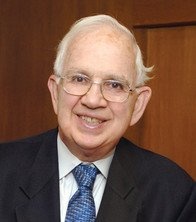Columbia College | Columbia University in the City of New York
Harold S. Kushner ’55, Distinguished Rabbi and Best-Selling Author

Kushner’s son, Aaron, was diagnosed at age 3 with a rare aging disease, progeria. He weighed only 25 pounds and was as tall as a 3-year-old when he died in 1977, two days after his 14th birthday. Kushner wrestled with the question, “Can I, in good faith, continue to teach people that the world is good, and that a kind and loving God is responsible for what happens in it?”
Kushner’s response was to write When Bad Things Happen to Good People (1981), contending that bad things happen to good people because God is endowed with unlimited love and justice, but exercises only finite power to prevent evil.
“Like a lot of children who feel they’re going to die soon, he was afraid he would be forgotten because he didn’t live long enough, not knowing parents never forget,” Kushner told CCT in 2008. “I promised I’d tell his story.”
The book was rejected by two publishers before it was accepted by Schocken Books and climbed to Number 1 on The New York Times Best Sellers list, transforming Kushner into a popular author and commentator. Several of his 14 books became best-sellers, resonating well beyond his Conservative Jewish congregation outside Boston and across religious boundaries in part because they had been inspired by his own experiences with grief, doubt and faith.
“It becomes much easier to take God seriously as the source of moral values if we don’t hold Him responsible for all the unfair things that happen in the world,” Kushner wrote. Regarding why illness may strike one and not another, he offered, “I can only assume that some natural laws which we don’t understand are at work. I cannot believe that God ‘sends’ illness to a specific person for a specific reason.”
Born on April 3, 1935, in the East New York section of Brooklyn, Kushner’s family moved to Crown Heights when he was in elementary school. A passionate Brooklyn Dodgers fan, he graduated from Erasmus Hall H.S. and had planned to major in psychology when he enrolled at the College but switched to literature after studying under Mark Van Doren GSAS 1920.
At the same time, Kushner attended evening classes at the Jewish Theological Seminary, and by his junior year at Columbia he had decided to become a rabbi. After graduation, he enrolled full-time at JTS, where he was ordained, graduated in 1960 — he earned a master’s from Columbia the same year — and earned a doctorate in 1972. He later studied at the Hebrew University in Jerusalem.
Kushner served for two years in the Army’s Chaplain Corps at Fort Sill, Okla. He was an assistant rabbi at Temple Israel in Great Neck, N.Y., for four years before becoming rabbi of Temple Israel in Natick, Mass., a suburb of Boston, in 1966. He served as the congregational rabbi there for 24 years and remained a member of the congregation until 2017.
Some of Kushner’s other books include How Good Do We Have to Be? A New Understanding of Guilt and Forgiveness (1997), Living a Life That Matters (2001) and The Lord Is My Shepherd: Healing Wisdom of the 23rd Psalm (2003). He also collaborated with novelist Chaim Potok in editing Etz Hayim: A Torah Commentary, the official commentary used by Conservative Jewish congregations, which was published by the Rabbinical Assembly and the Jewish Publication Society in 2001.
In 1999, Kushner was named clergyman of the year by Religion in American Life, and in 2007, the Jewish Book Council gave him a Lifetime Achievement Award.
Among Kushner’s many words of advice, he wrote, “People who pray for courage, for strength to bear the unbearable, for the grace to remember what they have left instead of what they have lost, very often find their prayer answered.” He also wrote, “Much of the time, we cannot control what happens to us. But we can always control how we respond to what happens to us.”
Kushner was predeceased by his brother, Paul, in 2019 and his wife, Suzette Estrada, in 2022. He is survived by his daughter, Ariel Kushner Haber; and two grandchildren.
— Alex Sachare ’71
Issue Contents
Published three times a year by Columbia College for alumni, students, faculty, parents and friends.
Columbia Alumni Center
622 W. 113th St., MC 4530, 6th Fl.
New York, NY 10025
212-851-7852
cct@columbia.edu
Columbia Alumni Center
622 W. 113th St., MC 4530, 4th Fl.
New York, NY 10025
212-851-7488
ccalumni@columbia.edu

